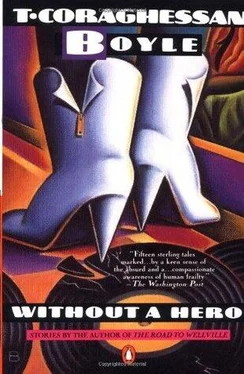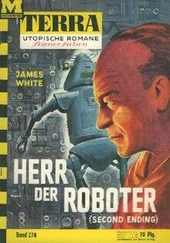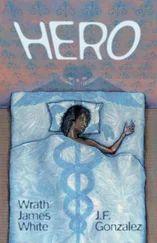T. Boyle - Without a Hero
Здесь есть возможность читать онлайн «T. Boyle - Without a Hero» весь текст электронной книги совершенно бесплатно (целиком полную версию без сокращений). В некоторых случаях можно слушать аудио, скачать через торрент в формате fb2 и присутствует краткое содержание. Год выпуска: 1995, Издательство: Penguin Books, Жанр: Современная проза, на английском языке. Описание произведения, (предисловие) а так же отзывы посетителей доступны на портале библиотеки ЛибКат.
- Название:Without a Hero
- Автор:
- Издательство:Penguin Books
- Жанр:
- Год:1995
- ISBN:нет данных
- Рейтинг книги:3 / 5. Голосов: 1
-
Избранное:Добавить в избранное
- Отзывы:
-
Ваша оценка:
- 60
- 1
- 2
- 3
- 4
- 5
Without a Hero: краткое содержание, описание и аннотация
Предлагаем к чтению аннотацию, описание, краткое содержание или предисловие (зависит от того, что написал сам автор книги «Without a Hero»). Если вы не нашли необходимую информацию о книге — напишите в комментариях, мы постараемся отыскать её.
Greasy Lake
People
Without a Hero
The Philadelphia Inquirer
Without a Hero — читать онлайн бесплатно полную книгу (весь текст) целиком
Ниже представлен текст книги, разбитый по страницам. Система сохранения места последней прочитанной страницы, позволяет с удобством читать онлайн бесплатно книгу «Without a Hero», без необходимости каждый раз заново искать на чём Вы остановились. Поставьте закладку, и сможете в любой момент перейти на страницу, на которой закончили чтение.
Интервал:
Закладка:
He was going to say something, goodbye or thanks for the ride or whatever, but in the end he decided against it. Somewhere, in some deep tunnel of what used to be his reality and was now somebody else’s, he even felt a stab of pity and, worse, guilt. But he comforted himself with the thought that if he hadn’t been there at the station, somebody else would have, and any way you looked at it Bird the Third would have wound up plucked. In the end, he just shrugged. Then he made his way off through the drifts, thinking maybe he’d just go on down to the station and check out the trains.
Oh, but it was cold. Cold to the bone. And dry. He knew the irony of it all too well — a shelf made of water, frozen and compacted over the howling eons, and not a drop to drink. It was locked in, unavailable, dry as paper. He shifted position and winced. It was his foot. He’d lost all feeling in it there for a while, but now it came back with a vengeance, a thousand hot needles radiating all the way up his leg to the thigh. That’s how it was with frostbite. He’d lose his toes, he knew that, but they’d all lost toes, fingers — the great ones — even the tips of their noses. There were continents to explore, unknown corners to make known, and what was a little discomfort compared to the greatness of that?
He thought of his father in the weather shack where he’d wintered alone, the fear of that eternal blackness closing in on him like a fist, alternately freezing and asphyxiating himself on the fumes from the kerosene stove. That was greatness. That was will. That was the indomitable spirit he’d inherited. But still, it was cold, terribly, implacably, unrelentingly cold, and his foot hurt him and he felt himself drifting off to sleep. That was how it happened, that was how they died out here, numbed by the cold, seduced into sleep and forgetfulness.
He stirred, and he fought it. He beat at his thighs, hammered his hands against the meat of his arms, but he couldn’t keep it up, and before long he subsided. He tried to call out, but his voice was gone, and besides, it was the coward’s way — his father would never have called out. Never. No, he would have gone on into the grip of that polar night, never wavering, never halting, on and on, into the dream.
BEAT
YEAH, I WAS BEAT. We were all Beat. Hell, I’m Beat now — is, was and always will be. I mean, how do you stop? But this isn’t about me — I’m nobody, really, just window-dressing on the whole mother of Bop freight-train-hopping holy higher than Tokay Beat trip into the heart of the American night. No, what I wanted to tell you about is Jack. And Neal and Allen and Bill and all the rest, too, and how it all went down, because I was there, I was on the scene, and there was nobody Beater than me.
Picture this: seventeen years old, hair an unholy mess and a little loden-green beret perched up on top to keep it in place, eighty-three cents in my pocket and a finger-greased copy of The Subterraneans in my rucksack along with a Charlie Parker disc with enough pops, scratches and white noise worked into the grooves to fill out the soundtrack of a sci-fi flick, hitched all the way from Oxnard, California, and there I am on Jack’s front porch in Northport, Long Island, December twenty-three, nineteen fifty-eight. It’s cold. Bleak. The town full of paint-peeling old monster houses, gray and worn and just plain old, like the whole horse-blindered tired-out East Coast locked in its gloom from October to April with no time off for good behavior. I’m wearing three sweaters under my Levi’s jacket and still I’m holding on to my ribs and I can feel the snot crusting round my nostrils and these mittens I bummed from an old lady at the Omaha bus station are stiff with it, and I knock, wondering if there’s an officially cool way to knock, a hipster’s way, a kind of secret Dharma Bums code-knock I don’t know about.
Knock-knock. Knockata-knockata, knock-knock-knock.
My first surprise was in store: it wasn’t Jack, the gone hep satori-seeking poet god of the rails and two-lane blacktop, who answered the door, but a big blocky old lady with a face like the bottom of a hiking boot. She was wearing a dress the size of something you’d drape over a car to keep the dust off it, and it was composed of a thousand little red and green triangles with gold trumpets and silver angels squeezed inside of them. She gave me the kind of look that could peel the tread off a recapped tire, the door held just ajar. I shuddered: she looked like somebody’s mother.
My own mother was three thousand miles away and so square she was cubed; my dog, the one I’d had since childhood, was dead, flattened out by a big rig the week earlier; and I’d flunked English, History, Calculus, Art, Phys. Ed., Music and Lunch. I wanted adventure, the life of the road, freewheeling chicks in berets and tea and bongos and long Benzedrine-inflected bullshit sessions that ran on into morning, I wanted Jack and everything he stood for, and here was this old lady. “Uh,” I stammered, fighting to control my voice, which was just then deepening from the adolescent squeak I’d had to live with since consciousness had hit, “does, uh, Jack Kerouac live here, I mean, by any chance?”
“Go back where you came from,” the old lady said. “My Jacky don’t have time for no more of this nonsense.” And that was it: she shut the door in my face.
My Jacky !
It came to me then: this was none other than Jack’s mother, the Bop-nurturing freewheeling wild Madonna herself, the woman who’d raised up the guru and given him form, mother of us all. And she’d locked me out. I’d come three thousand miles, her Jacky was my Jack, and I was cold through to the bone, stone broke, scared, heartsick and just about a lungful of O 2away from throwing myself down in the slush and sobbing till somebody came out and shot me. I knocked again.
“Hey, Ma,” I heard from somewhere deep inside the house, and it was like the rutting call of some dangerous beast, a muted angry threatening Bop-benny-and-jug-wine roar, the voice of the man himself, “what the hell is this, I’m trying to concentrate in here.”
And then the old lady: “It ain’t nothing, Jacky.”
Knock-knock. Knockata-knockata, knock-knock-knock. I para-diddled that door, knocked it and socked it, beat on it like it was the bald flat-topped dome of my uptight pencil-pushing drudge of a bourgeois father himself, or maybe Mr. Detwinder, the principal at Oxnard High. I knocked till my knuckles bled, a virtuoso of knocking, so caught up in the rhythm and energy of it that it took me a minute to realize the door was open and Jack himself standing there in the doorway. He looked the way Belmondo tried to look in Breathless , loose and cool in a rumpled T-shirt and jeans, with a smoke in one hand, a bottle of muscatel in the other.
I stopped knocking. My mouth fell open and the snot froze in my nostrils. “Jack Kerouac,” I said.
He let a grin slide down one side of his mouth and back up the other. “Nobody else,” he said.
The wind shot down my collar, I caught a glimpse of colored lights blinking on and off in the room behind him, and suddenly it was all gushing out of me like something I’d been chewing over and digesting all my life: “I hitched all the way from Oxnard and my name’s Wallace Pinto but you can call me Buzz and I just wanted to say, I just wanted to tell you—”
“Yeah, yeah, I know,” he said, waving a hand in dismissal, and he seemed unsteady on his muscatel-impaired feet, the smoke curling up to snatch at his cracked blue squinting eyes, the words slow on his lips, heavy, weighted and freighted with the deep everlasting bardic wisdom of the road, the cathouse and the seaman’s bar, “but I tell you, kid, you keep drumming on the door like that you’re going to end up in the hospital”—a pause—“or maybe a jazz combo.” I just stood there in a kind of trance until I felt his hand — his Dharma Bum Subterranean On the Road Bop-master’s gone Mexican-chick-digging hand — take hold of my shoulder and tug me forward, over the threshold and into the house. “You ever been introduced to a true and veritable set of tight-skinned bongos?” he asked, throwing an arm over my shoulder as the door slammed behind us.
Читать дальшеИнтервал:
Закладка:
Похожие книги на «Without a Hero»
Представляем Вашему вниманию похожие книги на «Without a Hero» списком для выбора. Мы отобрали схожую по названию и смыслу литературу в надежде предоставить читателям больше вариантов отыскать новые, интересные, ещё непрочитанные произведения.
Обсуждение, отзывы о книге «Without a Hero» и просто собственные мнения читателей. Оставьте ваши комментарии, напишите, что Вы думаете о произведении, его смысле или главных героях. Укажите что конкретно понравилось, а что нет, и почему Вы так считаете.











